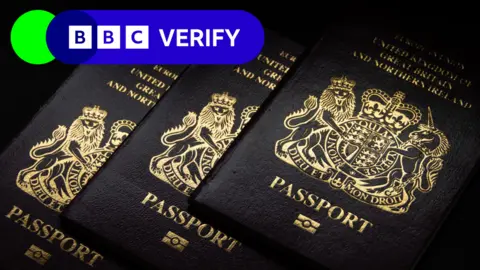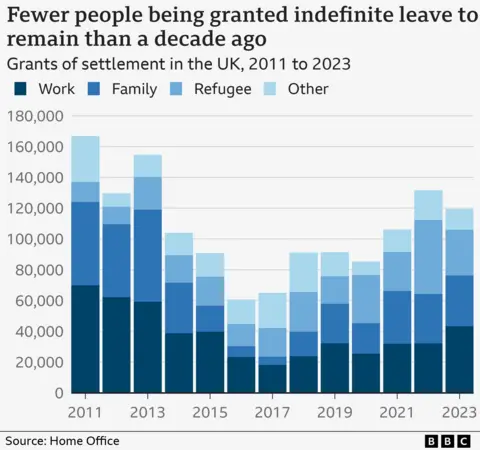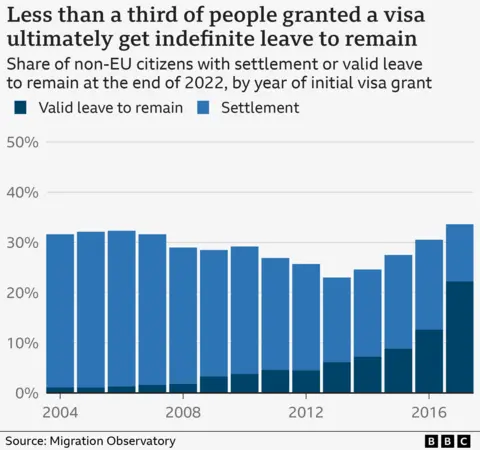Would the new Tory plan bring down immigration?
 Getty Images
Getty ImagesConservative leader Kemi Badenoch has proposed making it more difficult for new immigrants to be able to permanently settle in the UK.
She says her party wants to double the time it takes for new migrants to qualify for indefinite leave to remain (ILR) status from five years to 10 years.
In addition, the Tories say they would tighten the conditions on people applying for ILR.
Applicants would have to show they have not claimed benefits or used social housing and that their household has been a net contributor to the UK economy, meaning they pay more in tax than they take out in services.
In addition, those with a criminal record would be disqualified.
The Conservatives say these measures are part of their proposals for "urgent action to control our border".
BBC Verify has examined how many immigrants these proposals - if enacted - would likely affect.
We've also looked at whether the plans would be likely to reduce immigration to the UK.
What is indefinite leave to remain and how many get it?
Most new immigrants come to the UK on visas - such as work visas, family reunification visas or student visas - which come with restrictions on what they can do.
They are not generally allowed to access welfare benefits or vote in general elections.
They also have to pay special taxes such as the immigration health surcharge, which is currently up to £1,035 per year.
When an individual attains ILR - also known as settled status - they can access state benefits and use the NHS without extra charges.
They can also sponsor immigration applications in order to enable an overseas relative, such as a spouse, to come to the UK.
Most people have to have lived at least five years in the UK to apply for the status.
Official data from the Home Office shows there were around 120,000 grants of settled status in 2023.
That's roughly double the numbers awarded the status in 2016 and the data for the first three quarters of 2024 points to a further increase last year.
The total numbers, however, are still below 2011, when there were 167,000 ILR grants.

How many would the benefits restrictions affect?
The vast majority of new migrants who come on visas are already ineligible to claim benefits or apply for social housing under a visa condition called "No Recourse To Public Funds" (NRPF).
The Home Office does not record the exact number of people who hold visas with this condition but it estimated that it applied to about 3.3 million people at the end of 2023.
However, there are some exceptions.
Those who had their permission granted to stay in the UK on the basis of family or private life, or who hold British National Overseas visas (which applies to post-2021 immigrants from Hong Kong) can apply to have the restriction lifted.
That can only happen if the applicant can prove it is necessary for reasons of financial hardship or child welfare.
There were 3,759 applications to lift the NRPF condition for destitution reasons in the year ending December 2024, according to the latest Home Office figures.
There were 2,217 decisions made in the same period, and of those just over half (1,246) were approved.
Such individuals could, in theory, ultimately be denied ILR under the Conservatives' plans.
Asylum seekers also do not have recourse to public funds, but they do have access to state-provided accommodation and limited financial support. Asylum seekers are currently not normally permitted to work while their claim is being processed.
How many would the 'net contribution' restrictions affect?
The shadow home secretary Chris Philp clarified on Thursday how the Conservative policy on ILR applicants needing to show a net contribution to the UK economy would work.
He told the BBC: "There will be a salary level that we say above that salary level you are likely to be making a net contribution. For people with dependants that salary level will be a bit higher."
He did not specify what the salary level would be or how much higher it would be for people with dependants.
The Office for National Statistics (ONS) estimates that around half of UK individuals are in households that are net contributors, meaning they pay more in direct and indirect taxes than they receive in cash benefits and benefits in kind, such as school for their children.
It does not provide a breakdown showing the proportion of pre-settlement immigrants with this status.
However, it's possible that the share of recent immigrant households in this category will be higher, given that most are unable to claim benefits.
The fact that retired households are more likely to be net recipients according to the ONS, while immigrant households are more likely to be of working age, is another reason a higher share of immigrant households might be net contributors than the national average.
In recent years, the employment rate of working-age migrant men (82%) was higher than that of the UK-born (78%).
It's possible a household net contributor requirement could affect larger numbers of people on family visas (as opposed to work visas) meaning they might not qualify for ILR.
But failing to get ILR doesn't necessarily mean these individuals would be required to leave the UK. Some could stay with "limited leave to remain" but without settled status.
How many would the crime restrictions affect?
There are no official crime figures that are broken down by the immigration status of the perpetrators or alleged perpetrators.
But we do know about the number of foreign nationals held in prison.
There were 10,355 foreign offenders held in custody at the end of last year, making up 12% of the total prison population in England and Wales.
However, there are already criminal background checks on people applying for ILR, so the Conservative proposals to disqualify those immigrants who have committed crimes should not, in practice, make a difference.
Would all this reduce immigration?
Net migration into the UK - immigration minus emigration - hit a record 906,000 in the year to June 2023 and was an estimated 728,000 the following year, according to the ONS.
It's possible that some people might be deterred, in future, from coming to the UK in the first place if it were harder for them to get ILR, but many migration experts are sceptical that making it harder to claim settled status would have a major impact on these flows.
They point out that a majority of people coming into the UK on visas in recent decades did not ultimately claim ILR in any case.
Between 2004 and 2012, less than a third had applied for and received ILR.

"I wouldn't anticipate a large impact on net migration, though there could be some effect at the margins," says Madeleine Sumption of the Migration Observatory.
However, the Conservatives have also, separately, pledged to impose a "strict numerical cap" on immigration if they returned to power.
Additional reporting by Chris Jeavans, Phil Leake and Yaya Egwaikhide

